Stakeholder Protection vs. Shareholder Value in Corporate Law Essay
VerifiedAdded on 2023/05/28
|24
|6577
|125
Essay
AI Summary
This essay provides a detailed analysis of the debate between stakeholder protection and shareholder value in corporate law, primarily focusing on the UK's Companies Act 2006 and its implications. It examines the relationship between corporate theory and the stakeholder versus shareholder argument, exploring the arguments for both shareholder value and stakeholder protection. The essay delves into whether a compromise can be reached, particularly through the 'Enlightened Shareholder Value' approach. It also considers the impact of consumer activism on company performance and boardroom decisions, and the effectiveness of Section 172 of the Companies Act 2006 in protecting stakeholders. The essay further discusses the power of shareholders at AGMs and their rights under articles and remedies, ultimately evaluating the balance between shareholder rights and stakeholder rights within the legal framework.

Running Head: BUSINESS AND CORPORATION LAW 0
International Corporate Law
12/22/2018
Student’s Name
International Corporate Law
12/22/2018
Student’s Name
Paraphrase This Document
Need a fresh take? Get an instant paraphrase of this document with our AI Paraphraser
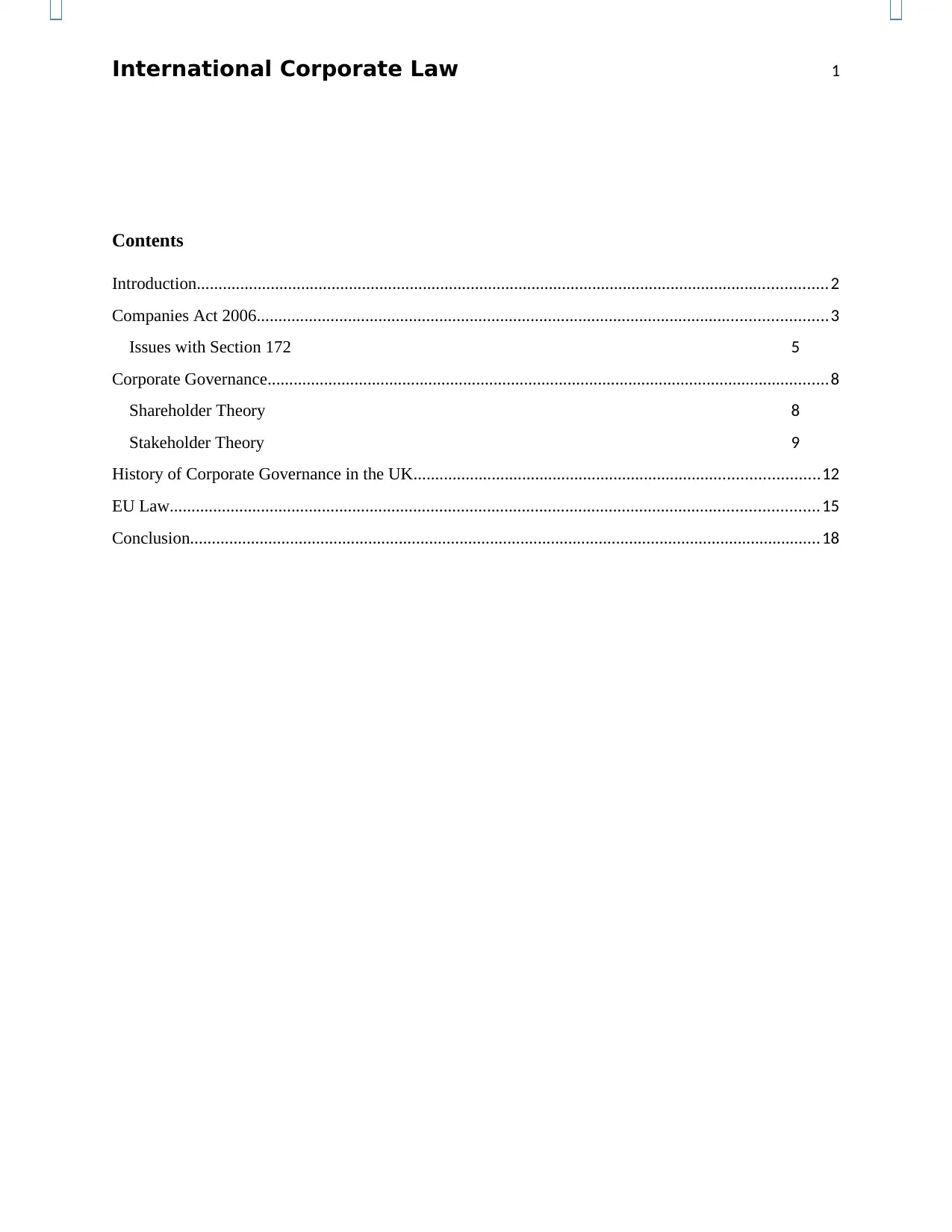
International Corporate Law 1
Contents
Introduction.................................................................................................................................................2
Companies Act 2006...................................................................................................................................3
Issues with Section 172 5
Corporate Governance.................................................................................................................................8
Shareholder Theory 8
Stakeholder Theory 9
History of Corporate Governance in the UK.............................................................................................12
EU Law.....................................................................................................................................................15
Conclusion.................................................................................................................................................18
Contents
Introduction.................................................................................................................................................2
Companies Act 2006...................................................................................................................................3
Issues with Section 172 5
Corporate Governance.................................................................................................................................8
Shareholder Theory 8
Stakeholder Theory 9
History of Corporate Governance in the UK.............................................................................................12
EU Law.....................................................................................................................................................15
Conclusion.................................................................................................................................................18
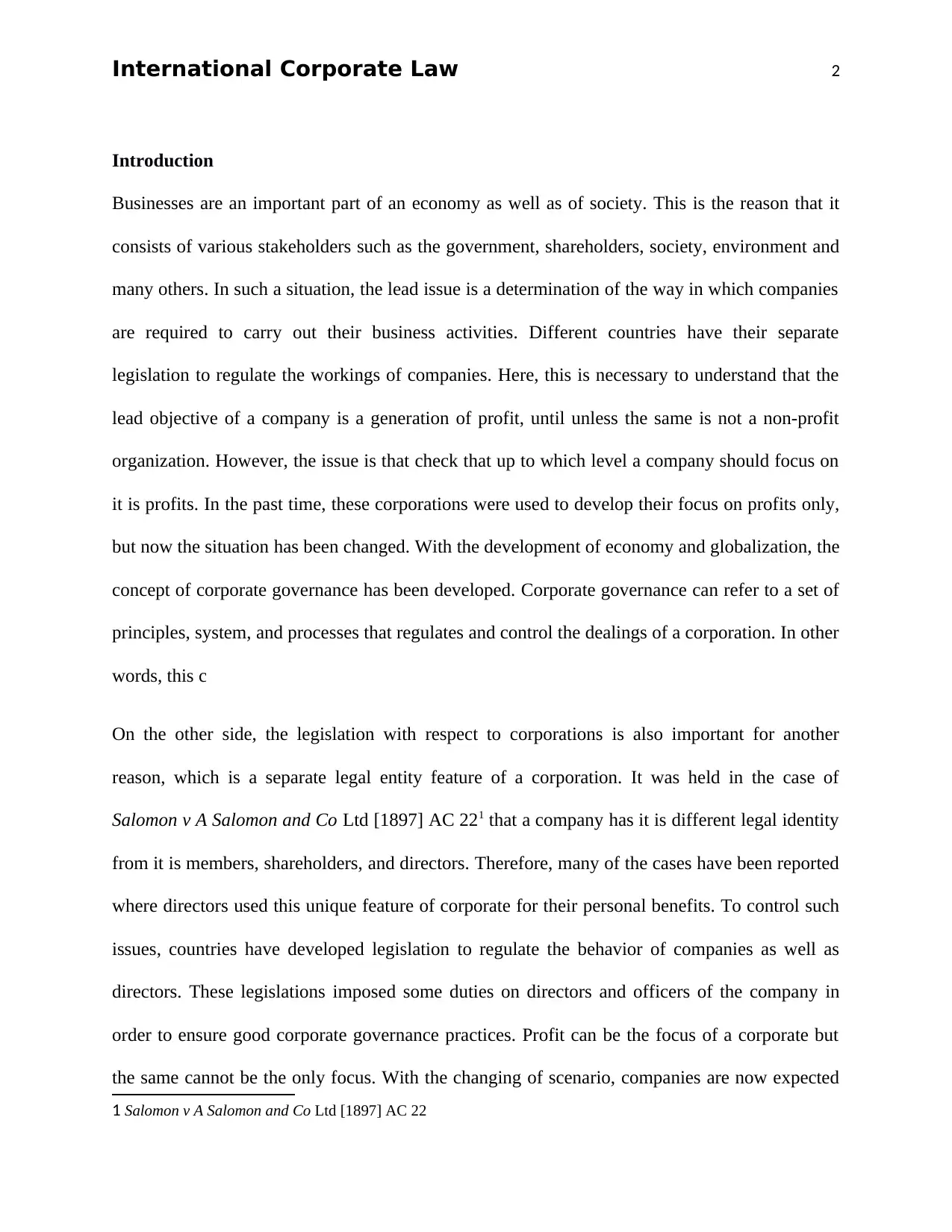
International Corporate Law 2
Introduction
Businesses are an important part of an economy as well as of society. This is the reason that it
consists of various stakeholders such as the government, shareholders, society, environment and
many others. In such a situation, the lead issue is a determination of the way in which companies
are required to carry out their business activities. Different countries have their separate
legislation to regulate the workings of companies. Here, this is necessary to understand that the
lead objective of a company is a generation of profit, until unless the same is not a non-profit
organization. However, the issue is that check that up to which level a company should focus on
it is profits. In the past time, these corporations were used to develop their focus on profits only,
but now the situation has been changed. With the development of economy and globalization, the
concept of corporate governance has been developed. Corporate governance can refer to a set of
principles, system, and processes that regulates and control the dealings of a corporation. In other
words, this c
On the other side, the legislation with respect to corporations is also important for another
reason, which is a separate legal entity feature of a corporation. It was held in the case of
Salomon v A Salomon and Co Ltd [1897] AC 221 that a company has it is different legal identity
from it is members, shareholders, and directors. Therefore, many of the cases have been reported
where directors used this unique feature of corporate for their personal benefits. To control such
issues, countries have developed legislation to regulate the behavior of companies as well as
directors. These legislations imposed some duties on directors and officers of the company in
order to ensure good corporate governance practices. Profit can be the focus of a corporate but
the same cannot be the only focus. With the changing of scenario, companies are now expected
1 Salomon v A Salomon and Co Ltd [1897] AC 22
Introduction
Businesses are an important part of an economy as well as of society. This is the reason that it
consists of various stakeholders such as the government, shareholders, society, environment and
many others. In such a situation, the lead issue is a determination of the way in which companies
are required to carry out their business activities. Different countries have their separate
legislation to regulate the workings of companies. Here, this is necessary to understand that the
lead objective of a company is a generation of profit, until unless the same is not a non-profit
organization. However, the issue is that check that up to which level a company should focus on
it is profits. In the past time, these corporations were used to develop their focus on profits only,
but now the situation has been changed. With the development of economy and globalization, the
concept of corporate governance has been developed. Corporate governance can refer to a set of
principles, system, and processes that regulates and control the dealings of a corporation. In other
words, this c
On the other side, the legislation with respect to corporations is also important for another
reason, which is a separate legal entity feature of a corporation. It was held in the case of
Salomon v A Salomon and Co Ltd [1897] AC 221 that a company has it is different legal identity
from it is members, shareholders, and directors. Therefore, many of the cases have been reported
where directors used this unique feature of corporate for their personal benefits. To control such
issues, countries have developed legislation to regulate the behavior of companies as well as
directors. These legislations imposed some duties on directors and officers of the company in
order to ensure good corporate governance practices. Profit can be the focus of a corporate but
the same cannot be the only focus. With the changing of scenario, companies are now expected
1 Salomon v A Salomon and Co Ltd [1897] AC 22
⊘ This is a preview!⊘
Do you want full access?
Subscribe today to unlock all pages.

Trusted by 1+ million students worldwide
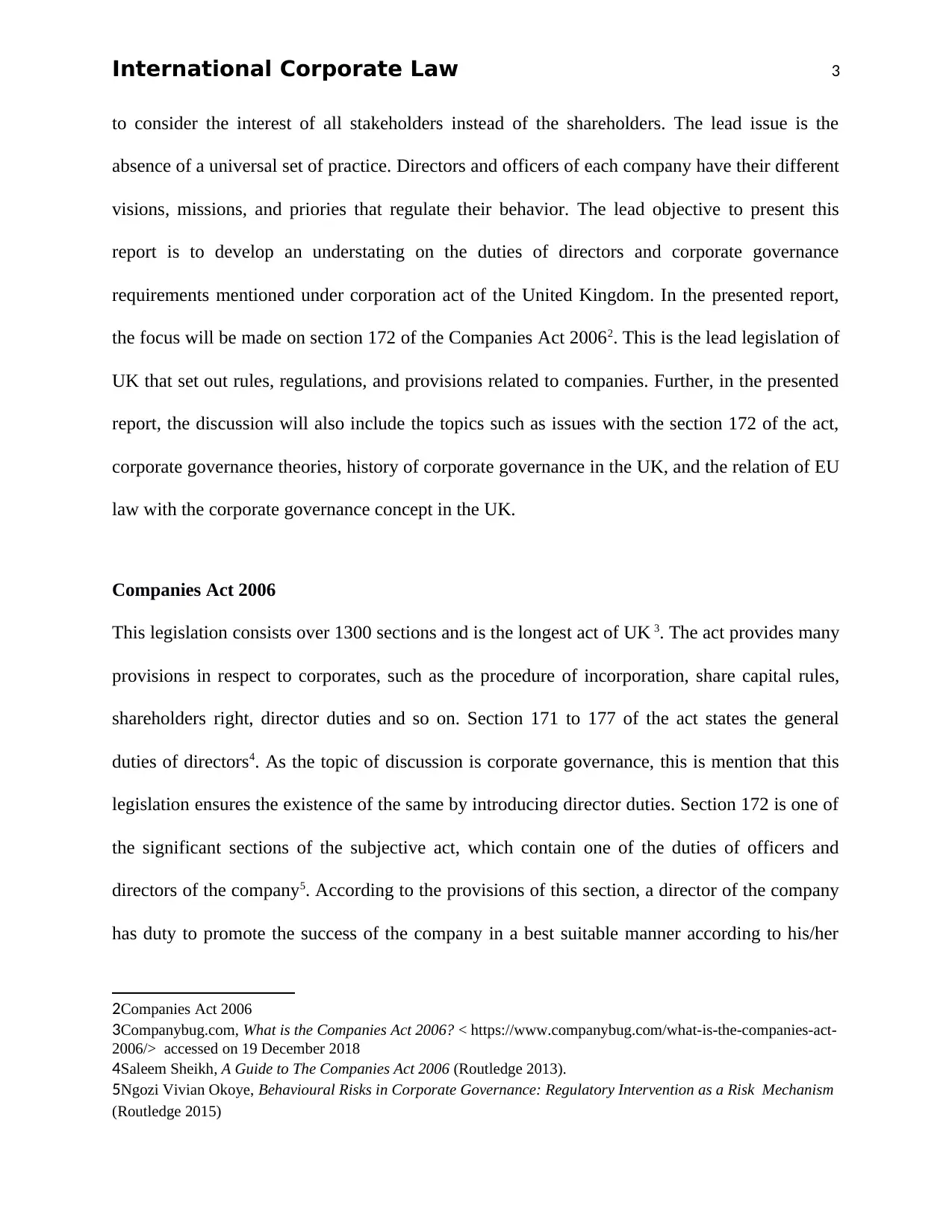
International Corporate Law 3
to consider the interest of all stakeholders instead of the shareholders. The lead issue is the
absence of a universal set of practice. Directors and officers of each company have their different
visions, missions, and priories that regulate their behavior. The lead objective to present this
report is to develop an understating on the duties of directors and corporate governance
requirements mentioned under corporation act of the United Kingdom. In the presented report,
the focus will be made on section 172 of the Companies Act 20062. This is the lead legislation of
UK that set out rules, regulations, and provisions related to companies. Further, in the presented
report, the discussion will also include the topics such as issues with the section 172 of the act,
corporate governance theories, history of corporate governance in the UK, and the relation of EU
law with the corporate governance concept in the UK.
Companies Act 2006
This legislation consists over 1300 sections and is the longest act of UK 3. The act provides many
provisions in respect to corporates, such as the procedure of incorporation, share capital rules,
shareholders right, director duties and so on. Section 171 to 177 of the act states the general
duties of directors4. As the topic of discussion is corporate governance, this is mention that this
legislation ensures the existence of the same by introducing director duties. Section 172 is one of
the significant sections of the subjective act, which contain one of the duties of officers and
directors of the company5. According to the provisions of this section, a director of the company
has duty to promote the success of the company in a best suitable manner according to his/her
2Companies Act 2006
3Companybug.com, What is the Companies Act 2006? < https://www.companybug.com/what-is-the-companies-act-
2006/> accessed on 19 December 2018
4Saleem Sheikh, A Guide to The Companies Act 2006 (Routledge 2013).
5Ngozi Vivian Okoye, Behavioural Risks in Corporate Governance: Regulatory Intervention as a Risk Mechanism
(Routledge 2015)
to consider the interest of all stakeholders instead of the shareholders. The lead issue is the
absence of a universal set of practice. Directors and officers of each company have their different
visions, missions, and priories that regulate their behavior. The lead objective to present this
report is to develop an understating on the duties of directors and corporate governance
requirements mentioned under corporation act of the United Kingdom. In the presented report,
the focus will be made on section 172 of the Companies Act 20062. This is the lead legislation of
UK that set out rules, regulations, and provisions related to companies. Further, in the presented
report, the discussion will also include the topics such as issues with the section 172 of the act,
corporate governance theories, history of corporate governance in the UK, and the relation of EU
law with the corporate governance concept in the UK.
Companies Act 2006
This legislation consists over 1300 sections and is the longest act of UK 3. The act provides many
provisions in respect to corporates, such as the procedure of incorporation, share capital rules,
shareholders right, director duties and so on. Section 171 to 177 of the act states the general
duties of directors4. As the topic of discussion is corporate governance, this is mention that this
legislation ensures the existence of the same by introducing director duties. Section 172 is one of
the significant sections of the subjective act, which contain one of the duties of officers and
directors of the company5. According to the provisions of this section, a director of the company
has duty to promote the success of the company in a best suitable manner according to his/her
2Companies Act 2006
3Companybug.com, What is the Companies Act 2006? < https://www.companybug.com/what-is-the-companies-act-
2006/> accessed on 19 December 2018
4Saleem Sheikh, A Guide to The Companies Act 2006 (Routledge 2013).
5Ngozi Vivian Okoye, Behavioural Risks in Corporate Governance: Regulatory Intervention as a Risk Mechanism
(Routledge 2015)
Paraphrase This Document
Need a fresh take? Get an instant paraphrase of this document with our AI Paraphraser
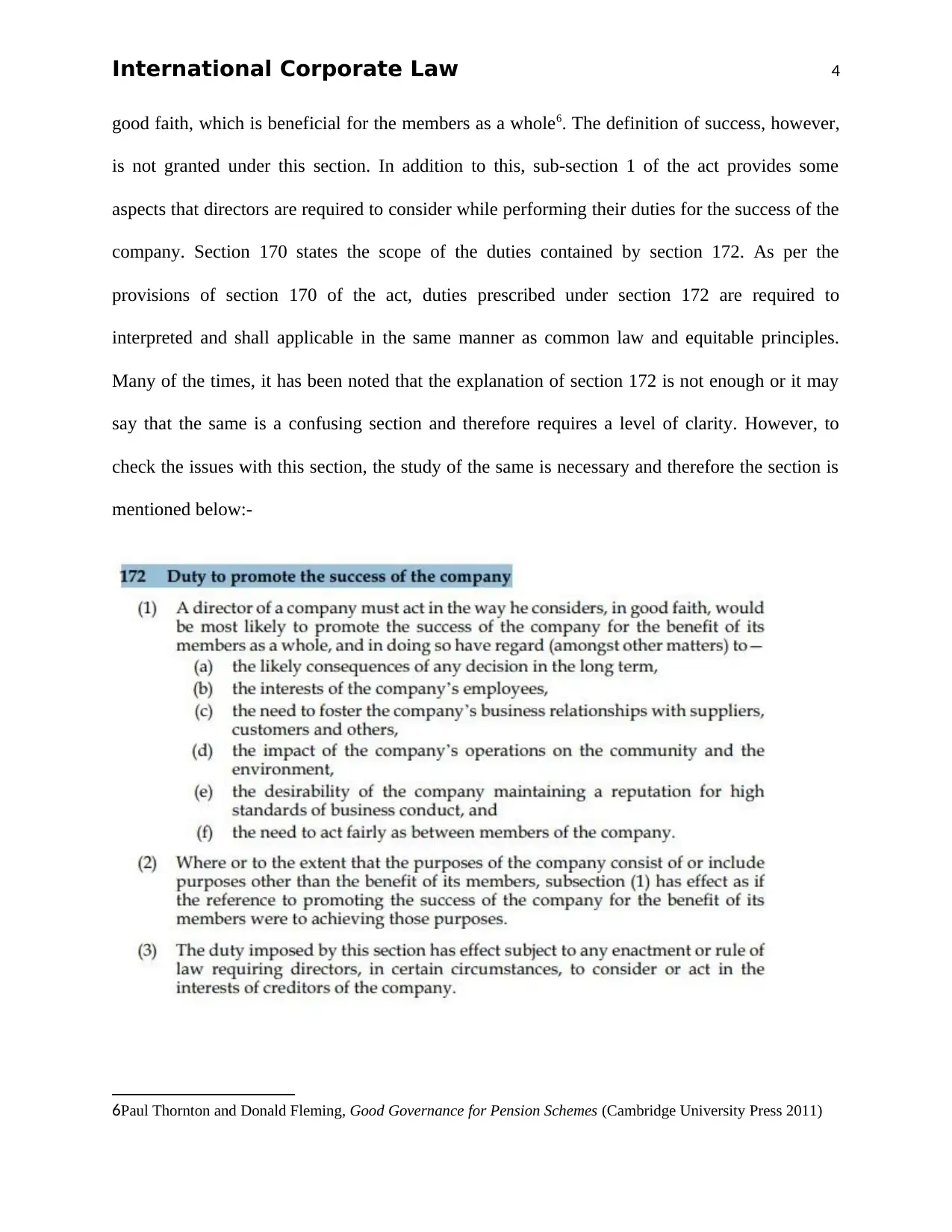
International Corporate Law 4
good faith, which is beneficial for the members as a whole6. The definition of success, however,
is not granted under this section. In addition to this, sub-section 1 of the act provides some
aspects that directors are required to consider while performing their duties for the success of the
company. Section 170 states the scope of the duties contained by section 172. As per the
provisions of section 170 of the act, duties prescribed under section 172 are required to
interpreted and shall applicable in the same manner as common law and equitable principles.
Many of the times, it has been noted that the explanation of section 172 is not enough or it may
say that the same is a confusing section and therefore requires a level of clarity. However, to
check the issues with this section, the study of the same is necessary and therefore the section is
mentioned below:-
6Paul Thornton and Donald Fleming, Good Governance for Pension Schemes (Cambridge University Press 2011)
good faith, which is beneficial for the members as a whole6. The definition of success, however,
is not granted under this section. In addition to this, sub-section 1 of the act provides some
aspects that directors are required to consider while performing their duties for the success of the
company. Section 170 states the scope of the duties contained by section 172. As per the
provisions of section 170 of the act, duties prescribed under section 172 are required to
interpreted and shall applicable in the same manner as common law and equitable principles.
Many of the times, it has been noted that the explanation of section 172 is not enough or it may
say that the same is a confusing section and therefore requires a level of clarity. However, to
check the issues with this section, the study of the same is necessary and therefore the section is
mentioned below:-
6Paul Thornton and Donald Fleming, Good Governance for Pension Schemes (Cambridge University Press 2011)
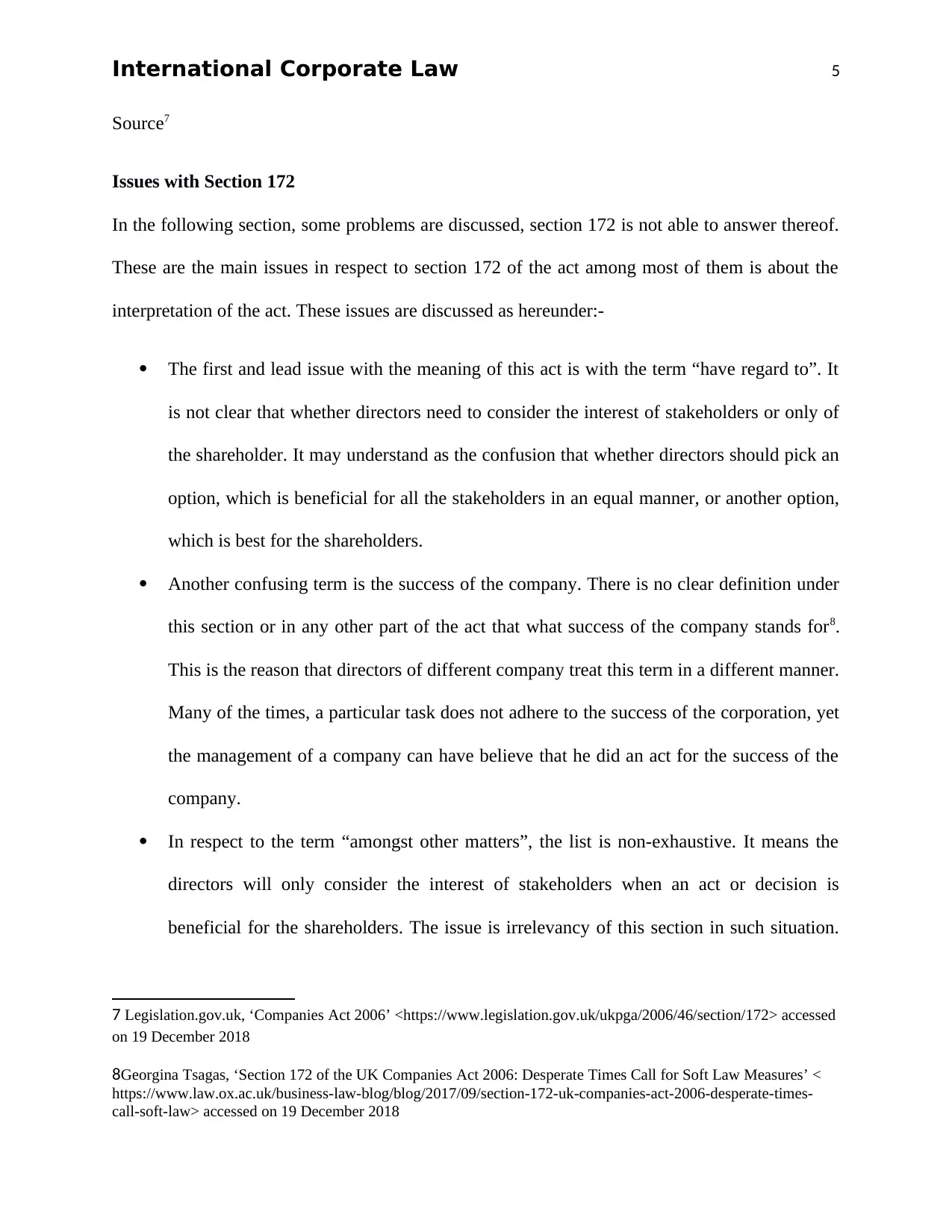
International Corporate Law 5
Source7
Issues with Section 172
In the following section, some problems are discussed, section 172 is not able to answer thereof.
These are the main issues in respect to section 172 of the act among most of them is about the
interpretation of the act. These issues are discussed as hereunder:-
The first and lead issue with the meaning of this act is with the term “have regard to”. It
is not clear that whether directors need to consider the interest of stakeholders or only of
the shareholder. It may understand as the confusion that whether directors should pick an
option, which is beneficial for all the stakeholders in an equal manner, or another option,
which is best for the shareholders.
Another confusing term is the success of the company. There is no clear definition under
this section or in any other part of the act that what success of the company stands for8.
This is the reason that directors of different company treat this term in a different manner.
Many of the times, a particular task does not adhere to the success of the corporation, yet
the management of a company can have believe that he did an act for the success of the
company.
In respect to the term “amongst other matters”, the list is non-exhaustive. It means the
directors will only consider the interest of stakeholders when an act or decision is
beneficial for the shareholders. The issue is irrelevancy of this section in such situation.
7 Legislation.gov.uk, ‘Companies Act 2006’ <https://www.legislation.gov.uk/ukpga/2006/46/section/172> accessed
on 19 December 2018
8Georgina Tsagas, ‘Section 172 of the UK Companies Act 2006: Desperate Times Call for Soft Law Measures’ <
https://www.law.ox.ac.uk/business-law-blog/blog/2017/09/section-172-uk-companies-act-2006-desperate-times-
call-soft-law> accessed on 19 December 2018
Source7
Issues with Section 172
In the following section, some problems are discussed, section 172 is not able to answer thereof.
These are the main issues in respect to section 172 of the act among most of them is about the
interpretation of the act. These issues are discussed as hereunder:-
The first and lead issue with the meaning of this act is with the term “have regard to”. It
is not clear that whether directors need to consider the interest of stakeholders or only of
the shareholder. It may understand as the confusion that whether directors should pick an
option, which is beneficial for all the stakeholders in an equal manner, or another option,
which is best for the shareholders.
Another confusing term is the success of the company. There is no clear definition under
this section or in any other part of the act that what success of the company stands for8.
This is the reason that directors of different company treat this term in a different manner.
Many of the times, a particular task does not adhere to the success of the corporation, yet
the management of a company can have believe that he did an act for the success of the
company.
In respect to the term “amongst other matters”, the list is non-exhaustive. It means the
directors will only consider the interest of stakeholders when an act or decision is
beneficial for the shareholders. The issue is irrelevancy of this section in such situation.
7 Legislation.gov.uk, ‘Companies Act 2006’ <https://www.legislation.gov.uk/ukpga/2006/46/section/172> accessed
on 19 December 2018
8Georgina Tsagas, ‘Section 172 of the UK Companies Act 2006: Desperate Times Call for Soft Law Measures’ <
https://www.law.ox.ac.uk/business-law-blog/blog/2017/09/section-172-uk-companies-act-2006-desperate-times-
call-soft-law> accessed on 19 December 2018
⊘ This is a preview!⊘
Do you want full access?
Subscribe today to unlock all pages.

Trusted by 1+ million students worldwide
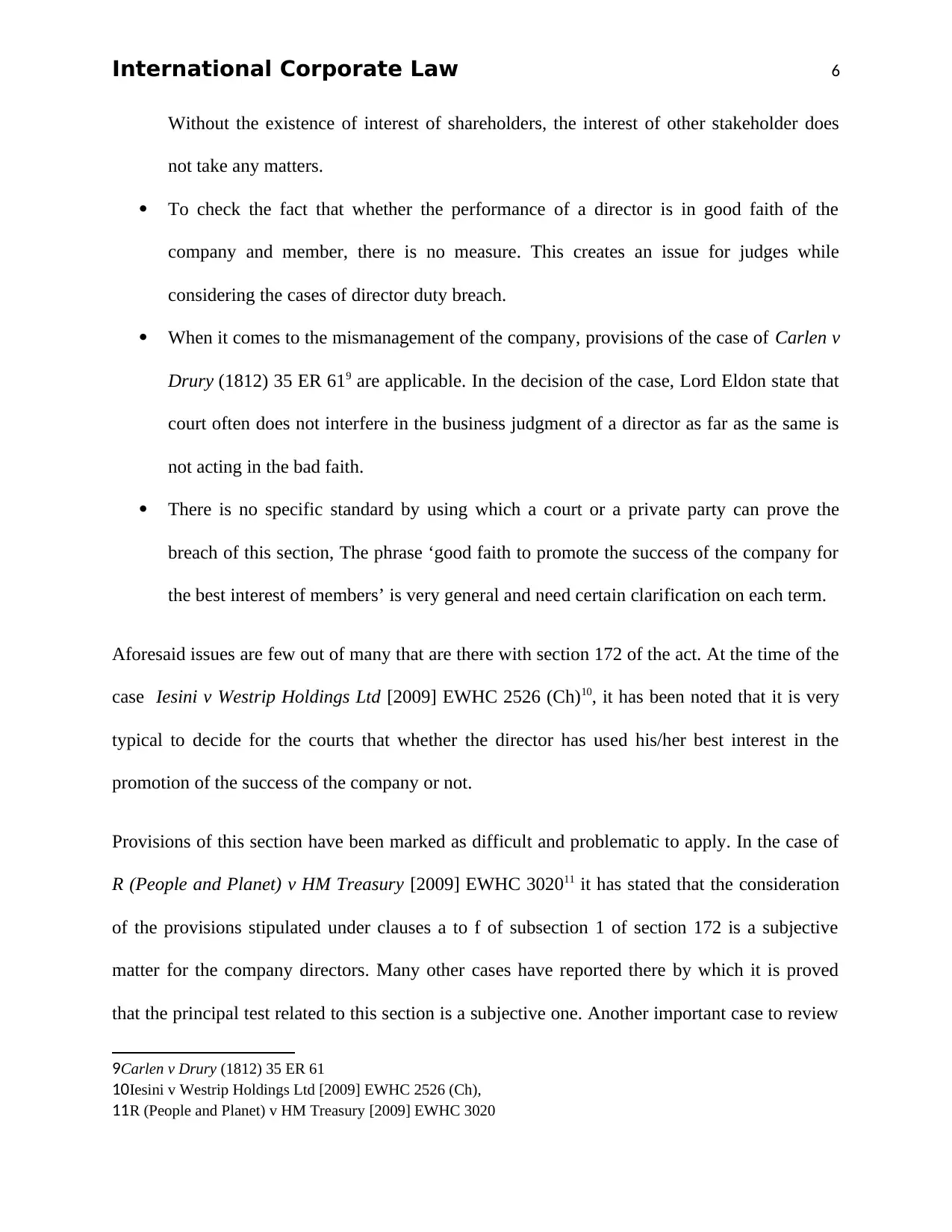
International Corporate Law 6
Without the existence of interest of shareholders, the interest of other stakeholder does
not take any matters.
To check the fact that whether the performance of a director is in good faith of the
company and member, there is no measure. This creates an issue for judges while
considering the cases of director duty breach.
When it comes to the mismanagement of the company, provisions of the case of Carlen v
Drury (1812) 35 ER 619 are applicable. In the decision of the case, Lord Eldon state that
court often does not interfere in the business judgment of a director as far as the same is
not acting in the bad faith.
There is no specific standard by using which a court or a private party can prove the
breach of this section, The phrase ‘good faith to promote the success of the company for
the best interest of members’ is very general and need certain clarification on each term.
Aforesaid issues are few out of many that are there with section 172 of the act. At the time of the
case Iesini v Westrip Holdings Ltd [2009] EWHC 2526 (Ch)10, it has been noted that it is very
typical to decide for the courts that whether the director has used his/her best interest in the
promotion of the success of the company or not.
Provisions of this section have been marked as difficult and problematic to apply. In the case of
R (People and Planet) v HM Treasury [2009] EWHC 302011 it has stated that the consideration
of the provisions stipulated under clauses a to f of subsection 1 of section 172 is a subjective
matter for the company directors. Many other cases have reported there by which it is proved
that the principal test related to this section is a subjective one. Another important case to review
9Carlen v Drury (1812) 35 ER 61
10Iesini v Westrip Holdings Ltd [2009] EWHC 2526 (Ch),
11R (People and Planet) v HM Treasury [2009] EWHC 3020
Without the existence of interest of shareholders, the interest of other stakeholder does
not take any matters.
To check the fact that whether the performance of a director is in good faith of the
company and member, there is no measure. This creates an issue for judges while
considering the cases of director duty breach.
When it comes to the mismanagement of the company, provisions of the case of Carlen v
Drury (1812) 35 ER 619 are applicable. In the decision of the case, Lord Eldon state that
court often does not interfere in the business judgment of a director as far as the same is
not acting in the bad faith.
There is no specific standard by using which a court or a private party can prove the
breach of this section, The phrase ‘good faith to promote the success of the company for
the best interest of members’ is very general and need certain clarification on each term.
Aforesaid issues are few out of many that are there with section 172 of the act. At the time of the
case Iesini v Westrip Holdings Ltd [2009] EWHC 2526 (Ch)10, it has been noted that it is very
typical to decide for the courts that whether the director has used his/her best interest in the
promotion of the success of the company or not.
Provisions of this section have been marked as difficult and problematic to apply. In the case of
R (People and Planet) v HM Treasury [2009] EWHC 302011 it has stated that the consideration
of the provisions stipulated under clauses a to f of subsection 1 of section 172 is a subjective
matter for the company directors. Many other cases have reported there by which it is proved
that the principal test related to this section is a subjective one. Another important case to review
9Carlen v Drury (1812) 35 ER 61
10Iesini v Westrip Holdings Ltd [2009] EWHC 2526 (Ch),
11R (People and Planet) v HM Treasury [2009] EWHC 3020
Paraphrase This Document
Need a fresh take? Get an instant paraphrase of this document with our AI Paraphraser
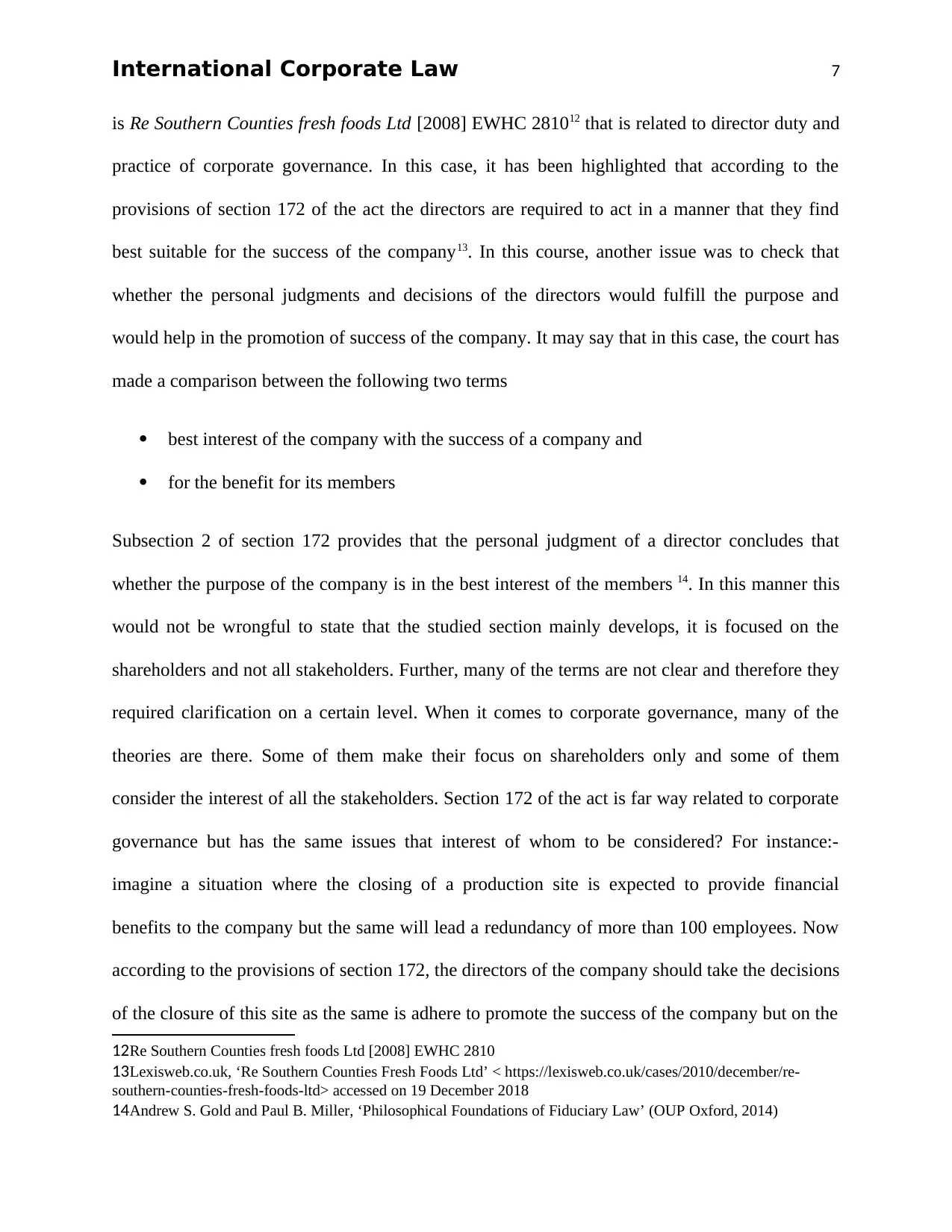
International Corporate Law 7
is Re Southern Counties fresh foods Ltd [2008] EWHC 281012 that is related to director duty and
practice of corporate governance. In this case, it has been highlighted that according to the
provisions of section 172 of the act the directors are required to act in a manner that they find
best suitable for the success of the company13. In this course, another issue was to check that
whether the personal judgments and decisions of the directors would fulfill the purpose and
would help in the promotion of success of the company. It may say that in this case, the court has
made a comparison between the following two terms
best interest of the company with the success of a company and
for the benefit for its members
Subsection 2 of section 172 provides that the personal judgment of a director concludes that
whether the purpose of the company is in the best interest of the members 14. In this manner this
would not be wrongful to state that the studied section mainly develops, it is focused on the
shareholders and not all stakeholders. Further, many of the terms are not clear and therefore they
required clarification on a certain level. When it comes to corporate governance, many of the
theories are there. Some of them make their focus on shareholders only and some of them
consider the interest of all the stakeholders. Section 172 of the act is far way related to corporate
governance but has the same issues that interest of whom to be considered? For instance:-
imagine a situation where the closing of a production site is expected to provide financial
benefits to the company but the same will lead a redundancy of more than 100 employees. Now
according to the provisions of section 172, the directors of the company should take the decisions
of the closure of this site as the same is adhere to promote the success of the company but on the
12Re Southern Counties fresh foods Ltd [2008] EWHC 2810
13Lexisweb.co.uk, ‘Re Southern Counties Fresh Foods Ltd’ < https://lexisweb.co.uk/cases/2010/december/re-
southern-counties-fresh-foods-ltd> accessed on 19 December 2018
14Andrew S. Gold and Paul B. Miller, ‘Philosophical Foundations of Fiduciary Law’ (OUP Oxford, 2014)
is Re Southern Counties fresh foods Ltd [2008] EWHC 281012 that is related to director duty and
practice of corporate governance. In this case, it has been highlighted that according to the
provisions of section 172 of the act the directors are required to act in a manner that they find
best suitable for the success of the company13. In this course, another issue was to check that
whether the personal judgments and decisions of the directors would fulfill the purpose and
would help in the promotion of success of the company. It may say that in this case, the court has
made a comparison between the following two terms
best interest of the company with the success of a company and
for the benefit for its members
Subsection 2 of section 172 provides that the personal judgment of a director concludes that
whether the purpose of the company is in the best interest of the members 14. In this manner this
would not be wrongful to state that the studied section mainly develops, it is focused on the
shareholders and not all stakeholders. Further, many of the terms are not clear and therefore they
required clarification on a certain level. When it comes to corporate governance, many of the
theories are there. Some of them make their focus on shareholders only and some of them
consider the interest of all the stakeholders. Section 172 of the act is far way related to corporate
governance but has the same issues that interest of whom to be considered? For instance:-
imagine a situation where the closing of a production site is expected to provide financial
benefits to the company but the same will lead a redundancy of more than 100 employees. Now
according to the provisions of section 172, the directors of the company should take the decisions
of the closure of this site as the same is adhere to promote the success of the company but on the
12Re Southern Counties fresh foods Ltd [2008] EWHC 2810
13Lexisweb.co.uk, ‘Re Southern Counties Fresh Foods Ltd’ < https://lexisweb.co.uk/cases/2010/december/re-
southern-counties-fresh-foods-ltd> accessed on 19 December 2018
14Andrew S. Gold and Paul B. Miller, ‘Philosophical Foundations of Fiduciary Law’ (OUP Oxford, 2014)
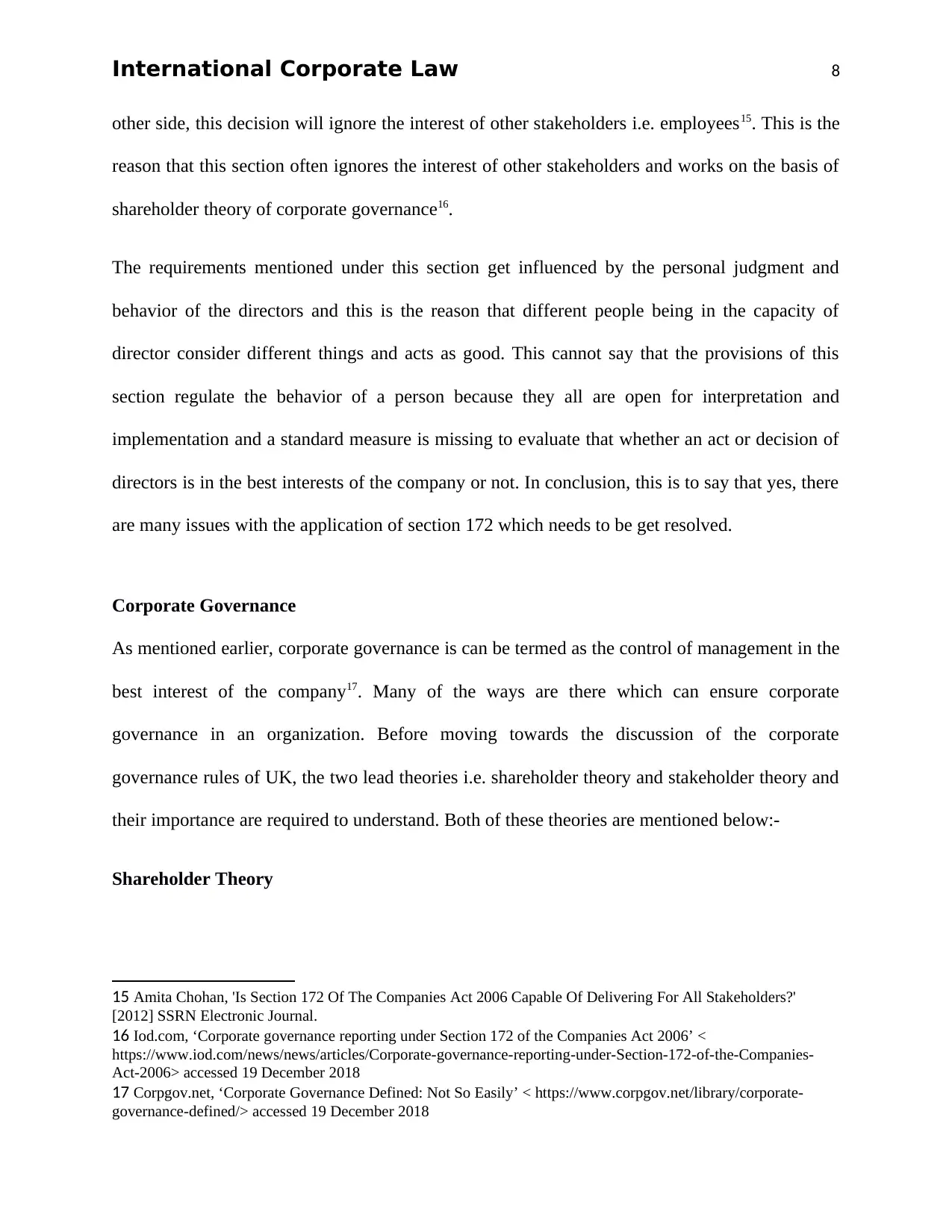
International Corporate Law 8
other side, this decision will ignore the interest of other stakeholders i.e. employees15. This is the
reason that this section often ignores the interest of other stakeholders and works on the basis of
shareholder theory of corporate governance16.
The requirements mentioned under this section get influenced by the personal judgment and
behavior of the directors and this is the reason that different people being in the capacity of
director consider different things and acts as good. This cannot say that the provisions of this
section regulate the behavior of a person because they all are open for interpretation and
implementation and a standard measure is missing to evaluate that whether an act or decision of
directors is in the best interests of the company or not. In conclusion, this is to say that yes, there
are many issues with the application of section 172 which needs to be get resolved.
Corporate Governance
As mentioned earlier, corporate governance is can be termed as the control of management in the
best interest of the company17. Many of the ways are there which can ensure corporate
governance in an organization. Before moving towards the discussion of the corporate
governance rules of UK, the two lead theories i.e. shareholder theory and stakeholder theory and
their importance are required to understand. Both of these theories are mentioned below:-
Shareholder Theory
15 Amita Chohan, 'Is Section 172 Of The Companies Act 2006 Capable Of Delivering For All Stakeholders?'
[2012] SSRN Electronic Journal.
16 Iod.com, ‘Corporate governance reporting under Section 172 of the Companies Act 2006’ <
https://www.iod.com/news/news/articles/Corporate-governance-reporting-under-Section-172-of-the-Companies-
Act-2006> accessed 19 December 2018
17 Corpgov.net, ‘Corporate Governance Defined: Not So Easily’ < https://www.corpgov.net/library/corporate-
governance-defined/> accessed 19 December 2018
other side, this decision will ignore the interest of other stakeholders i.e. employees15. This is the
reason that this section often ignores the interest of other stakeholders and works on the basis of
shareholder theory of corporate governance16.
The requirements mentioned under this section get influenced by the personal judgment and
behavior of the directors and this is the reason that different people being in the capacity of
director consider different things and acts as good. This cannot say that the provisions of this
section regulate the behavior of a person because they all are open for interpretation and
implementation and a standard measure is missing to evaluate that whether an act or decision of
directors is in the best interests of the company or not. In conclusion, this is to say that yes, there
are many issues with the application of section 172 which needs to be get resolved.
Corporate Governance
As mentioned earlier, corporate governance is can be termed as the control of management in the
best interest of the company17. Many of the ways are there which can ensure corporate
governance in an organization. Before moving towards the discussion of the corporate
governance rules of UK, the two lead theories i.e. shareholder theory and stakeholder theory and
their importance are required to understand. Both of these theories are mentioned below:-
Shareholder Theory
15 Amita Chohan, 'Is Section 172 Of The Companies Act 2006 Capable Of Delivering For All Stakeholders?'
[2012] SSRN Electronic Journal.
16 Iod.com, ‘Corporate governance reporting under Section 172 of the Companies Act 2006’ <
https://www.iod.com/news/news/articles/Corporate-governance-reporting-under-Section-172-of-the-Companies-
Act-2006> accessed 19 December 2018
17 Corpgov.net, ‘Corporate Governance Defined: Not So Easily’ < https://www.corpgov.net/library/corporate-
governance-defined/> accessed 19 December 2018
⊘ This is a preview!⊘
Do you want full access?
Subscribe today to unlock all pages.

Trusted by 1+ million students worldwide
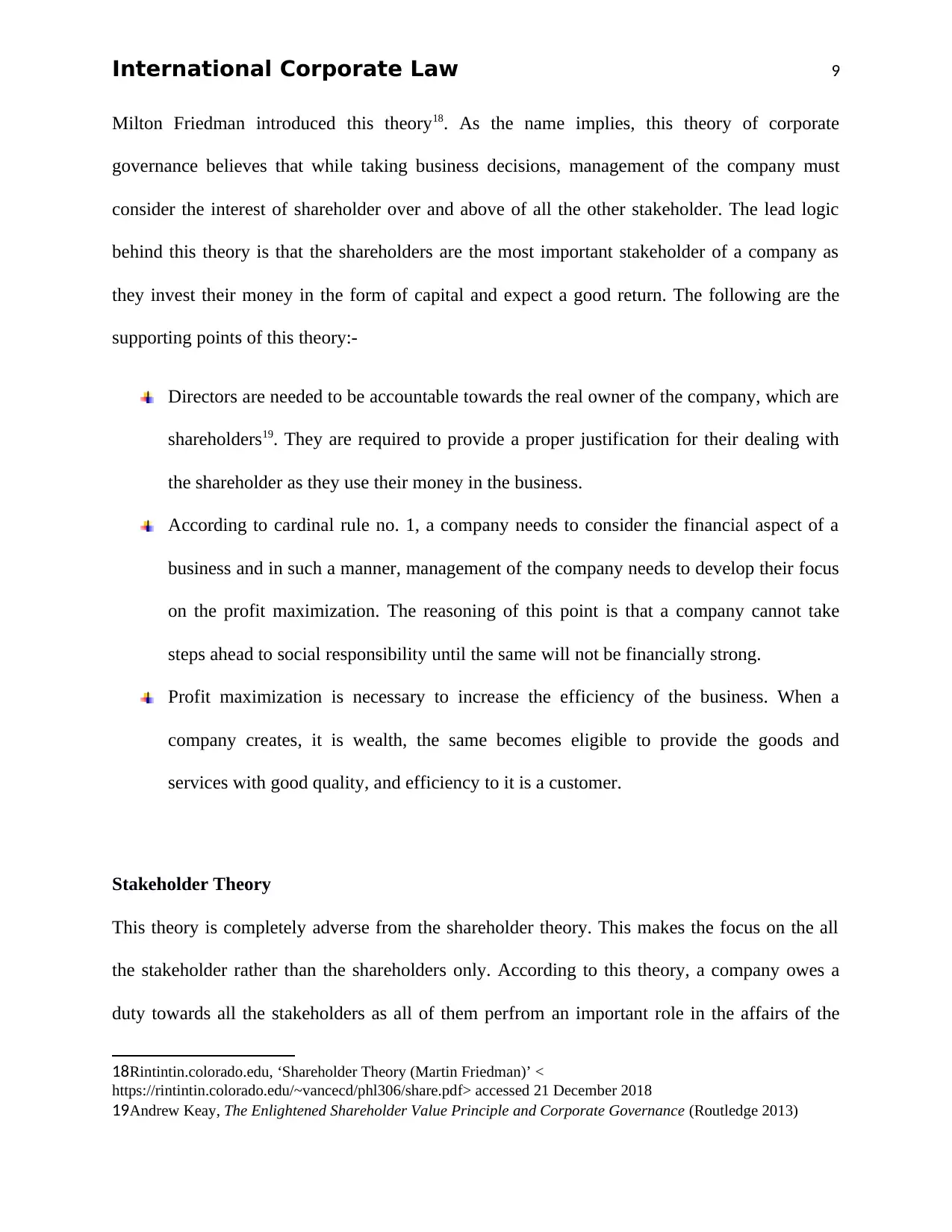
International Corporate Law 9
Milton Friedman introduced this theory18. As the name implies, this theory of corporate
governance believes that while taking business decisions, management of the company must
consider the interest of shareholder over and above of all the other stakeholder. The lead logic
behind this theory is that the shareholders are the most important stakeholder of a company as
they invest their money in the form of capital and expect a good return. The following are the
supporting points of this theory:-
Directors are needed to be accountable towards the real owner of the company, which are
shareholders19. They are required to provide a proper justification for their dealing with
the shareholder as they use their money in the business.
According to cardinal rule no. 1, a company needs to consider the financial aspect of a
business and in such a manner, management of the company needs to develop their focus
on the profit maximization. The reasoning of this point is that a company cannot take
steps ahead to social responsibility until the same will not be financially strong.
Profit maximization is necessary to increase the efficiency of the business. When a
company creates, it is wealth, the same becomes eligible to provide the goods and
services with good quality, and efficiency to it is a customer.
Stakeholder Theory
This theory is completely adverse from the shareholder theory. This makes the focus on the all
the stakeholder rather than the shareholders only. According to this theory, a company owes a
duty towards all the stakeholders as all of them perfrom an important role in the affairs of the
18Rintintin.colorado.edu, ‘Shareholder Theory (Martin Friedman)’ <
https://rintintin.colorado.edu/~vancecd/phl306/share.pdf> accessed 21 December 2018
19Andrew Keay, The Enlightened Shareholder Value Principle and Corporate Governance (Routledge 2013)
Milton Friedman introduced this theory18. As the name implies, this theory of corporate
governance believes that while taking business decisions, management of the company must
consider the interest of shareholder over and above of all the other stakeholder. The lead logic
behind this theory is that the shareholders are the most important stakeholder of a company as
they invest their money in the form of capital and expect a good return. The following are the
supporting points of this theory:-
Directors are needed to be accountable towards the real owner of the company, which are
shareholders19. They are required to provide a proper justification for their dealing with
the shareholder as they use their money in the business.
According to cardinal rule no. 1, a company needs to consider the financial aspect of a
business and in such a manner, management of the company needs to develop their focus
on the profit maximization. The reasoning of this point is that a company cannot take
steps ahead to social responsibility until the same will not be financially strong.
Profit maximization is necessary to increase the efficiency of the business. When a
company creates, it is wealth, the same becomes eligible to provide the goods and
services with good quality, and efficiency to it is a customer.
Stakeholder Theory
This theory is completely adverse from the shareholder theory. This makes the focus on the all
the stakeholder rather than the shareholders only. According to this theory, a company owes a
duty towards all the stakeholders as all of them perfrom an important role in the affairs of the
18Rintintin.colorado.edu, ‘Shareholder Theory (Martin Friedman)’ <
https://rintintin.colorado.edu/~vancecd/phl306/share.pdf> accessed 21 December 2018
19Andrew Keay, The Enlightened Shareholder Value Principle and Corporate Governance (Routledge 2013)
Paraphrase This Document
Need a fresh take? Get an instant paraphrase of this document with our AI Paraphraser
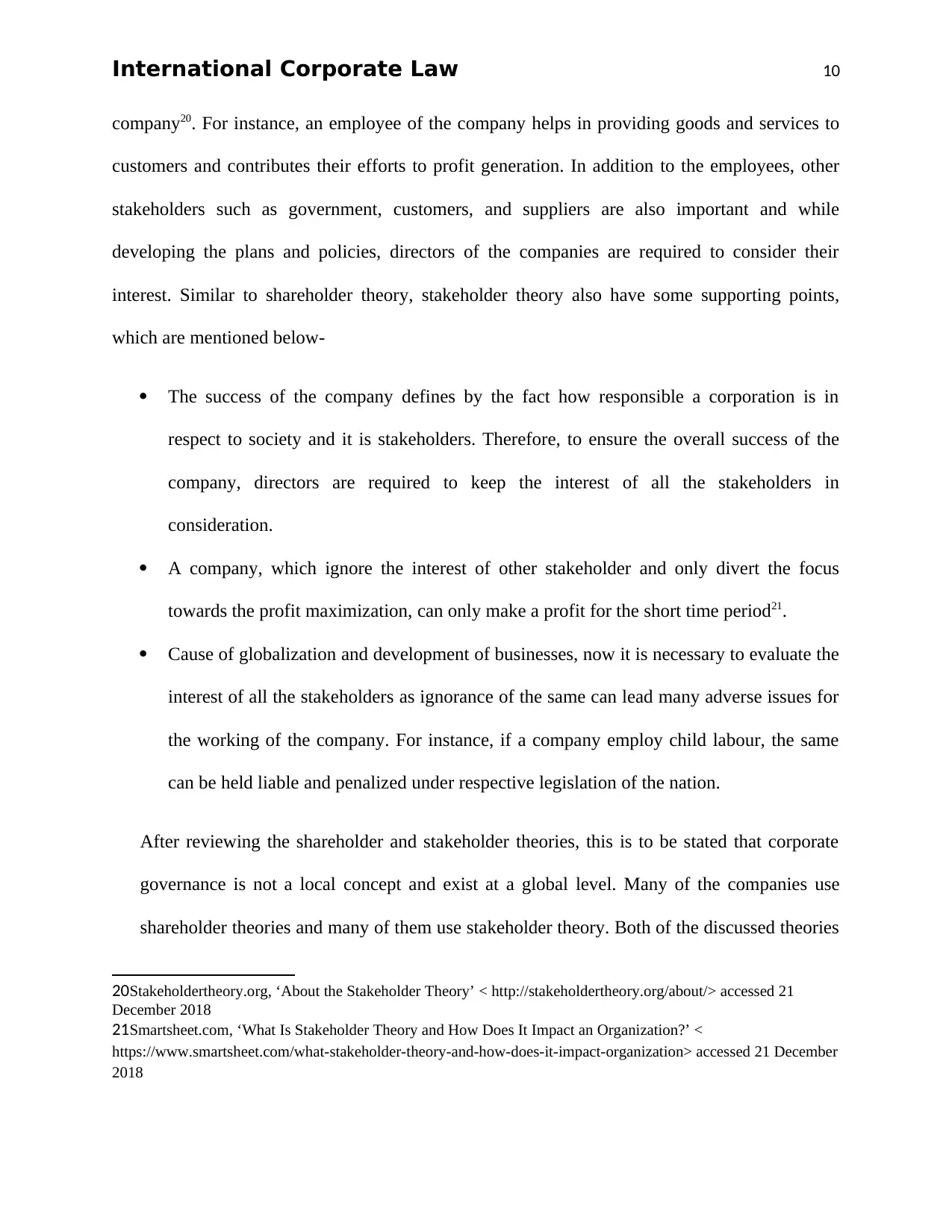
International Corporate Law 10
company20. For instance, an employee of the company helps in providing goods and services to
customers and contributes their efforts to profit generation. In addition to the employees, other
stakeholders such as government, customers, and suppliers are also important and while
developing the plans and policies, directors of the companies are required to consider their
interest. Similar to shareholder theory, stakeholder theory also have some supporting points,
which are mentioned below-
The success of the company defines by the fact how responsible a corporation is in
respect to society and it is stakeholders. Therefore, to ensure the overall success of the
company, directors are required to keep the interest of all the stakeholders in
consideration.
A company, which ignore the interest of other stakeholder and only divert the focus
towards the profit maximization, can only make a profit for the short time period21.
Cause of globalization and development of businesses, now it is necessary to evaluate the
interest of all the stakeholders as ignorance of the same can lead many adverse issues for
the working of the company. For instance, if a company employ child labour, the same
can be held liable and penalized under respective legislation of the nation.
After reviewing the shareholder and stakeholder theories, this is to be stated that corporate
governance is not a local concept and exist at a global level. Many of the companies use
shareholder theories and many of them use stakeholder theory. Both of the discussed theories
20Stakeholdertheory.org, ‘About the Stakeholder Theory’ < http://stakeholdertheory.org/about/> accessed 21
December 2018
21Smartsheet.com, ‘What Is Stakeholder Theory and How Does It Impact an Organization?’ <
https://www.smartsheet.com/what-stakeholder-theory-and-how-does-it-impact-organization> accessed 21 December
2018
company20. For instance, an employee of the company helps in providing goods and services to
customers and contributes their efforts to profit generation. In addition to the employees, other
stakeholders such as government, customers, and suppliers are also important and while
developing the plans and policies, directors of the companies are required to consider their
interest. Similar to shareholder theory, stakeholder theory also have some supporting points,
which are mentioned below-
The success of the company defines by the fact how responsible a corporation is in
respect to society and it is stakeholders. Therefore, to ensure the overall success of the
company, directors are required to keep the interest of all the stakeholders in
consideration.
A company, which ignore the interest of other stakeholder and only divert the focus
towards the profit maximization, can only make a profit for the short time period21.
Cause of globalization and development of businesses, now it is necessary to evaluate the
interest of all the stakeholders as ignorance of the same can lead many adverse issues for
the working of the company. For instance, if a company employ child labour, the same
can be held liable and penalized under respective legislation of the nation.
After reviewing the shareholder and stakeholder theories, this is to be stated that corporate
governance is not a local concept and exist at a global level. Many of the companies use
shareholder theories and many of them use stakeholder theory. Both of the discussed theories
20Stakeholdertheory.org, ‘About the Stakeholder Theory’ < http://stakeholdertheory.org/about/> accessed 21
December 2018
21Smartsheet.com, ‘What Is Stakeholder Theory and How Does It Impact an Organization?’ <
https://www.smartsheet.com/what-stakeholder-theory-and-how-does-it-impact-organization> accessed 21 December
2018
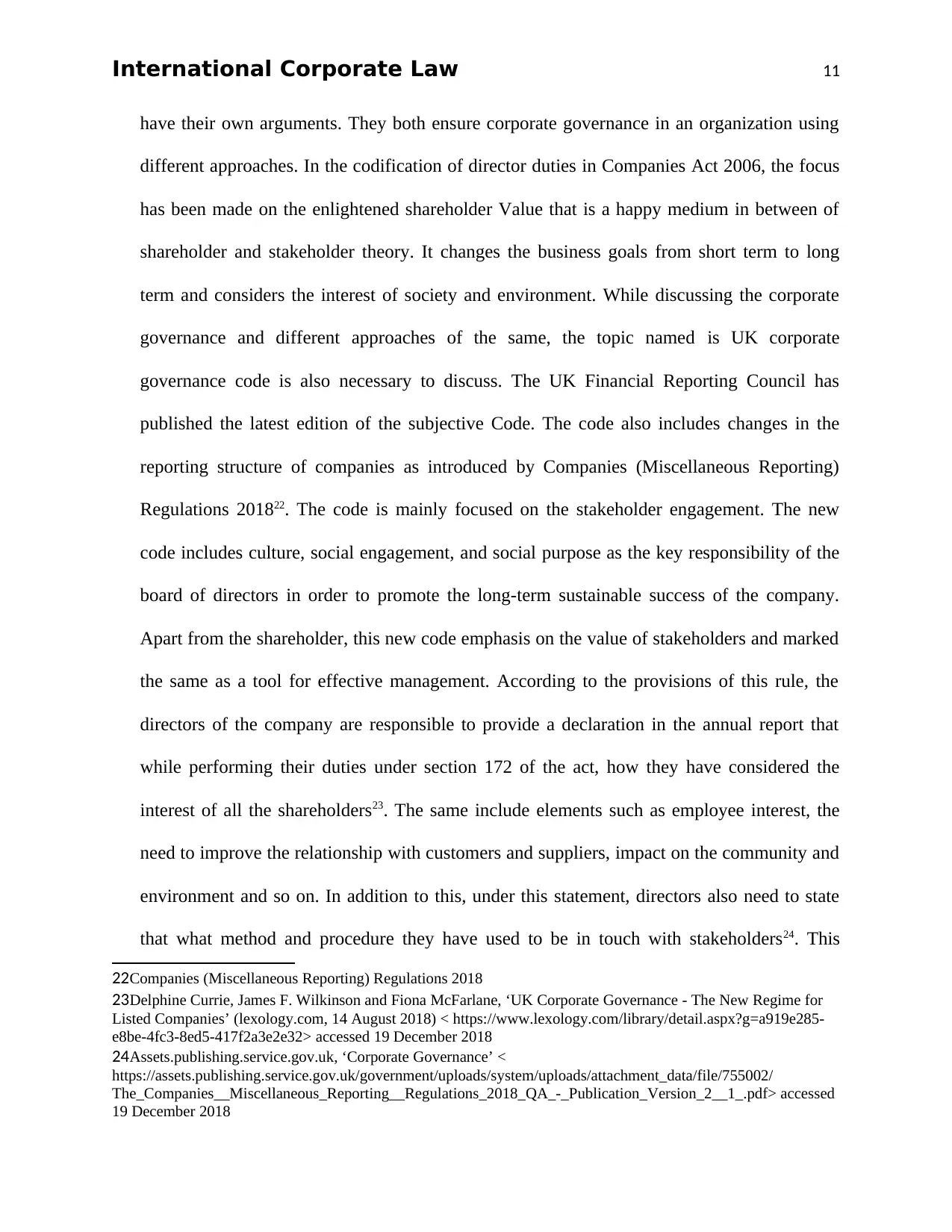
International Corporate Law 11
have their own arguments. They both ensure corporate governance in an organization using
different approaches. In the codification of director duties in Companies Act 2006, the focus
has been made on the enlightened shareholder Value that is a happy medium in between of
shareholder and stakeholder theory. It changes the business goals from short term to long
term and considers the interest of society and environment. While discussing the corporate
governance and different approaches of the same, the topic named is UK corporate
governance code is also necessary to discuss. The UK Financial Reporting Council has
published the latest edition of the subjective Code. The code also includes changes in the
reporting structure of companies as introduced by Companies (Miscellaneous Reporting)
Regulations 201822. The code is mainly focused on the stakeholder engagement. The new
code includes culture, social engagement, and social purpose as the key responsibility of the
board of directors in order to promote the long-term sustainable success of the company.
Apart from the shareholder, this new code emphasis on the value of stakeholders and marked
the same as a tool for effective management. According to the provisions of this rule, the
directors of the company are responsible to provide a declaration in the annual report that
while performing their duties under section 172 of the act, how they have considered the
interest of all the shareholders23. The same include elements such as employee interest, the
need to improve the relationship with customers and suppliers, impact on the community and
environment and so on. In addition to this, under this statement, directors also need to state
that what method and procedure they have used to be in touch with stakeholders24. This
22Companies (Miscellaneous Reporting) Regulations 2018
23Delphine Currie, James F. Wilkinson and Fiona McFarlane, ‘UK Corporate Governance - The New Regime for
Listed Companies’ (lexology.com, 14 August 2018) < https://www.lexology.com/library/detail.aspx?g=a919e285-
e8be-4fc3-8ed5-417f2a3e2e32> accessed 19 December 2018
24Assets.publishing.service.gov.uk, ‘Corporate Governance’ <
https://assets.publishing.service.gov.uk/government/uploads/system/uploads/attachment_data/file/755002/
The_Companies__Miscellaneous_Reporting__Regulations_2018_QA_-_Publication_Version_2__1_.pdf> accessed
19 December 2018
have their own arguments. They both ensure corporate governance in an organization using
different approaches. In the codification of director duties in Companies Act 2006, the focus
has been made on the enlightened shareholder Value that is a happy medium in between of
shareholder and stakeholder theory. It changes the business goals from short term to long
term and considers the interest of society and environment. While discussing the corporate
governance and different approaches of the same, the topic named is UK corporate
governance code is also necessary to discuss. The UK Financial Reporting Council has
published the latest edition of the subjective Code. The code also includes changes in the
reporting structure of companies as introduced by Companies (Miscellaneous Reporting)
Regulations 201822. The code is mainly focused on the stakeholder engagement. The new
code includes culture, social engagement, and social purpose as the key responsibility of the
board of directors in order to promote the long-term sustainable success of the company.
Apart from the shareholder, this new code emphasis on the value of stakeholders and marked
the same as a tool for effective management. According to the provisions of this rule, the
directors of the company are responsible to provide a declaration in the annual report that
while performing their duties under section 172 of the act, how they have considered the
interest of all the shareholders23. The same include elements such as employee interest, the
need to improve the relationship with customers and suppliers, impact on the community and
environment and so on. In addition to this, under this statement, directors also need to state
that what method and procedure they have used to be in touch with stakeholders24. This
22Companies (Miscellaneous Reporting) Regulations 2018
23Delphine Currie, James F. Wilkinson and Fiona McFarlane, ‘UK Corporate Governance - The New Regime for
Listed Companies’ (lexology.com, 14 August 2018) < https://www.lexology.com/library/detail.aspx?g=a919e285-
e8be-4fc3-8ed5-417f2a3e2e32> accessed 19 December 2018
24Assets.publishing.service.gov.uk, ‘Corporate Governance’ <
https://assets.publishing.service.gov.uk/government/uploads/system/uploads/attachment_data/file/755002/
The_Companies__Miscellaneous_Reporting__Regulations_2018_QA_-_Publication_Version_2__1_.pdf> accessed
19 December 2018
⊘ This is a preview!⊘
Do you want full access?
Subscribe today to unlock all pages.

Trusted by 1+ million students worldwide
1 out of 24
Related Documents
Your All-in-One AI-Powered Toolkit for Academic Success.
+13062052269
info@desklib.com
Available 24*7 on WhatsApp / Email
![[object Object]](/_next/static/media/star-bottom.7253800d.svg)
Unlock your academic potential
Copyright © 2020–2026 A2Z Services. All Rights Reserved. Developed and managed by ZUCOL.





